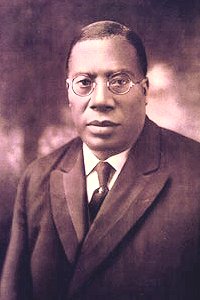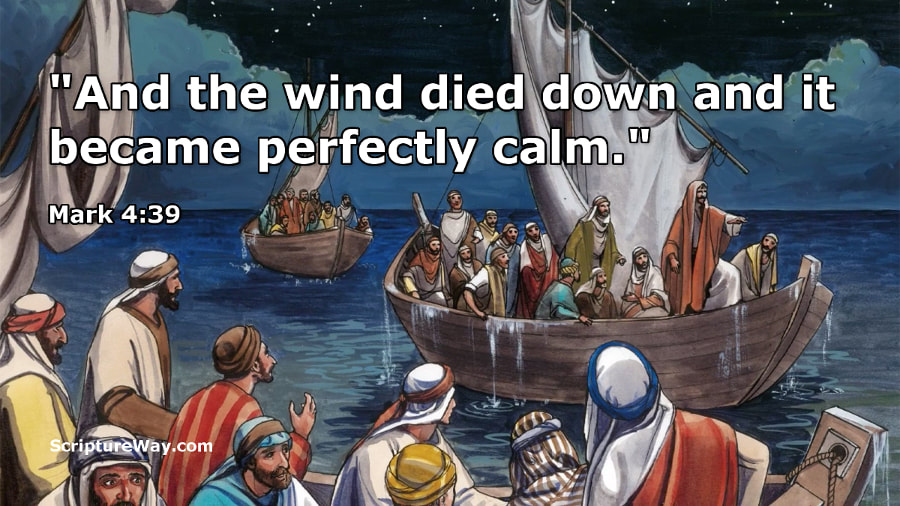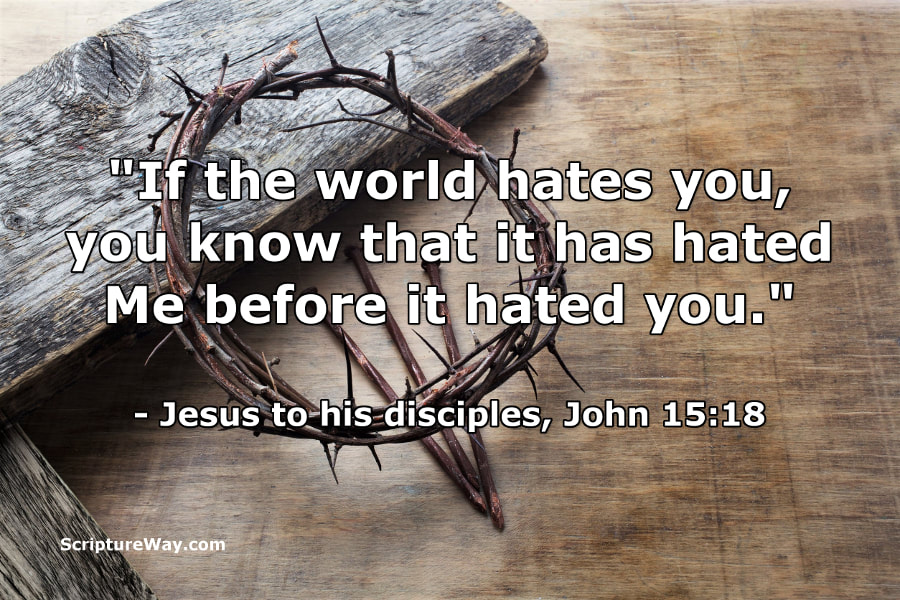"And there arose a fierce gale of wind, and the waves were breaking over the boat so much that the boat was already filling up. Jesus Himself was in the stern, asleep on the cushion; and they woke Him and said to Him, 'Teacher, do You not care that we are perishing?' And He got up and rebuked the wind and said to the sea, 'Hush, be still.' And the wind died down and it became perfectly calm. And He said to them, 'Why are you afraid? Do you still have no faith?' They became very much afraid and said to one another, 'Who then is this, that even the wind and the sea obey Him?' " (Mark 4:37-41) "When the storms of life are raging, Stand by me (stand by me); When the storms of life are raging, Stand by me (stand by me); When the world is tossing me Like a ship upon the sea Thou who rulest wind and water, Stand by me (stand by me)." -- Charles Albert Tindley, 1905 This article describes the background and scripture allusions for the gospel hymn, "Stand by Me," by Rev. Dr. Charles A. Tindley. Consider. Are you going through a personal storm today? The same Jesus who rebuked the wind and said to the sea, "Hush, be still," can calm your personal storms.  Rev. Dr. Charles A. Tindley (Ref. 2) Rev. Dr. Charles A. Tindley (Ref. 2) Hymn Author and Composer. The Reverend Dr. Charles Albert Tindley (1851-1933) was an American Methodist minister and was one of the founding fathers of American gospel music (Ref. 1, Ref. 2). He was the son of a slave, and he taught himself to read and write. After the American Civil War he moved to Philadelphia as a young person where he found employment as a hod carrier (brick carrier) (Ref. 1). He and his wife Daisy attended the Bainbridge Street Methodist Episcopal Church in Philadelphia where Charles became the sexton (janitor) (Ref. 1, Ref. 3). Tindley was never able to go to school (Ref. 1). He was self-taught, never graduating from college or seminary, yet he acquired and read more than 8,000 books (Ref. 4). Tindley learned Hebrew through the help of a Philadelphia synagogue, and he learned Greek by taking a correspondence course through the Boston Theological School. Tindley qualified for ordination in the Methodist Episcopal Church by examination (Ref. 1). After serving churches in Delaware, New Jersey, and Maryland, Tindley later became the pastor at the same church in Philadelphia where he had been a janitor (Ref. 1, Ref. 4). Under his leadership and powerful preaching, the multi-racial congregation grew from 130 members to more than 10,000 members (Ref. 1, Ref. 3). Tindley was awarded honorary Doctor of Divinity degrees by Bennett College (North Carolina) and Morgan College (Maryland) (Ref. 1). Life was not easy for people in the northeastern United States at the turn of the 20th century. The area near Tindley's church was economically depressed, especially for African Americans during this time (Ref. 4). The hymn "Stand By Me" speaks to the difficulties that many of Tindley's parishioners faced (Ref. 4). Charles A. Tindley composed and published over 40 gospel songs (Ref. 1, Ref. 2). His best-known gospel songs include "Stand by Me" (Ref. 5), "Leave it There" (Ref. 6), and "We'll Understand It Better By and By" (Ref. 7). His song, "I’ll Overcome Some Day" (Ref. 8) was the basis for the American civil rights anthem "We Shall Overcome," popularized in the 1960s (Ref. 2). "Stand By Me" Scripture Allusions. Below I describe several phrases from the "Stand by Me" hymn text and their scripture allusions. To see the complete set of all five verses of the hymn text, please click either on the attached lyric sheet or hymn sheet.
Listen. The music for "Stand By Me" will encourage you. Watch one or both of the music videos below.
Apply. Thank Jesus for the times he has stood by you during the challenges you have faced in life. Ask Jesus to stand by you, to give you strength and courage, and to calm the storm you are going through today. References
1. https://en.wikipedia.org/wiki/Charles_Albert_Tindley 2. http://www.hymntime.com/tch/bio/t/i/n/tindley_ca.htm 3. http://www.dubois-theward.org/history/congregations/tindley-temple/ 4. https://www.umcdiscipleship.org/resources/history-of-hymns-stand-by-me 5. http://www.hymntime.com/tch/htm/s/t/a/n/standbym.htm 6. http://www.hymntime.com/tch/htm/l/e/a/v/leaveitt.htm 7. http://www.hymntime.com/tch/htm/w/e/l/u/welunder.htm 8. http://www.hymntime.com/tch/htm/i/l/l/o/illoverc.htm 9. https://biblehub.com/commentaries/benson/2_timothy/4.htm
4 Comments
Updated - 13 June 2024
"If the world hates you, you know that it has hated Me before it hated you. If you were of the world, the world would love its own; but because you are not of the world, but I chose you out of the world, because of this the world hates you." (John 15:18-19)
This lesson is the third in the series on "Christians and the World" (Ref. 1, Ref. 2). This lesson explains why "the world" hates Jesus and his disciples. This lesson also explains the scriptural basis for joy when Jesus' disciples (that is, we who believe in him) encounter the world's hatred.
The scriptures in this lesson are quoted from the New American Standard Bible (NASB) unless noted otherwise (Ref. 3).
Consider. Have you experienced the world's hatred because you are Christ's disciple? Do you see the world's opposition to yourself or to Christians in general as a cause for joy?
Biblical definition of "the world"
"For God so loved the world, that He gave His only Son, so that everyone who believes in Him will not perish, but have eternal life." (John 3:16)
Let's revisit the definition of "the world" from the first lesson in this series, "Biblical Definition of the World" (Ref. 1). The Greek word for "the world" in the New Testament is kosmos. In the New Testament, and particularly in the Gospel of John, kosmos is used in five ways:
The main scriptures for this lesson, John 7:7 and John 15:18-19, refer to the fourth definition above for "the world" -- "people who are hostile to Christ and to Christ's followers."
Biblical definition of "hate"
"For not even His brothers believed in Him. So Jesus said to them, 'My time is not yet here, but your time is always ready. The world cannot hate you, but it hates Me because I testify about it, that its deeds are evil.'" (John 7:5-7)
Let's look at the definition of the Greek word for hate. The Greek word for hate used in John 7:7 and John 15:18-19 is miseó (pronounced mis-eh'-o) (Ref. 4). Miseó means "to detest (on a comparative basis); to love someone or something less than someone (something) else; to renounce one choice in favor of another" (HELPS Word-studies - Ref. 4). Note that according to this definition, hate involves making a choice - for example, whether to love Jesus or not to love Jesus. We see the same Greek word used for hate throughout the New Testament, for example, in Matthew 5:43-44, Mark 13:13, Luke 16:13, John 3:19-20, Romans 7:15, 1 John 2:11, and Revelation 2:6.
Yes, the world hates Jesus
When Jesus spoke to his half-brothers who did not believe in him, Jesus said, "The world cannot hate you, but it hates Me because I testify about it, that its deeds are evil" (John 7:7, Matthew 13:55). Examples of evil deeds that Jesus pointed out to his adversaries include unbelief (John 8:21-24) and hypocrisy (Matthew 23:13-15, 23). Jesus also told his adversaries that their father was the devil (John 8:44). That is why his "opposers" hated Jesus. American theologian Albert Barnes wrote, "This was the main cause of the opposition which was made to him. He proclaimed that men were depraved, and the result was that they hated him" (Ref. 5, Ref. 6).
Note, however, there is good news. Even a former "hater" of Christ can be redeemed because Jesus has already shed his blood for them (Ephesians 1:7 ESV, 1 Peter 1:18-19). James, one of Jesus' half-brothers, later became a believer in Jesus and a pillar of the early church (Matthew 13:55, Galatians 2:9, Acts 15:13). Yes, the world hates Jesus' disciples
During the evening before his death, Jesus spoke many comforting words to his disciples (John chapters 14, 15, and 16). Jesus was preparing them for his departure and for the hatred and persecution they would face. Jesus said, "If the world hates you, you know that it has hated Me before it hated you. If you were of the world, the world would love its own; but because you are not of the world, but I chose you out of the world, because of this the world hates you" (John 15:18-19).
In John 15:19, Jesus stated two reasons why the world hates his disciples:
Jesus gives his disciples joy
"These things I have spoken to you so that My joy may be in you, and that your joy may be made full." (John 15:11)
For we who believe in Jesus and follow him as his disciples:
Apply. Pray for yourself and those Christians in the world who are facing the world's hatred, opposition, and persecution. Pray for yourself and those Christians to remain joyful and to have God's peace in the face of the world's hatred.
Related Lessons
"Biblical Definition of the World" (John 1:10) "The Holy Spirit Whom the World Cannot Receive" (John 14:16-17) "Do Not Love the World - 1 John 2:15 Meaning" "What Is Redemption?" (Ephesians 1:7)
References
1. http://www.ScriptureWay.com/home/biblical-definition-of-the-world 2. Ref. 2 begins on the next line http://www.ScriptureWay.com/home/the-most-important-offer-you-will-ever-receive 3. https://www.biblegateway.com/versions/New-American-Standard-Bible-NASB/ 4. https://biblehub.com/greek/3404.htm 5. https://biblehub.com/commentaries/barnes/john/7.htm Barnes' Notes - John 7:7 6. https://en.wikipedia.org/wiki/Albert_Barnes_(theologian) 7. https://biblehub.com/commentaries/pulpit/john/15.htm Pulpit Commentary - John 15:19 8. https://biblehub.com/commentaries/gill/john/15.htm Gill's Exposition - John 15:19 9. http://www.ScriptureWay/home/the-spirit-of-truth 10. https://www.scriptureway.com/home/the-holy-spirit-whom-the-world-cannot-receive |
Daily Bible Verse(Click the link above) AuthorMr. Whitney V. Myers. Christian. For more information, please visit the Author Page. Posting ScheduleI plan to provide new postings about once a month. Planned Topics(subject to change) Recent Posts(most recent three months) Popular Posts(top 10) Categories
All
Archives
July 2024
|
|
Copyright 2018-2024 Whitney V. Myers |
Listed in Feedspot's Top 100 Bible Study Blogs and Websites |


 RSS Feed
RSS Feed
